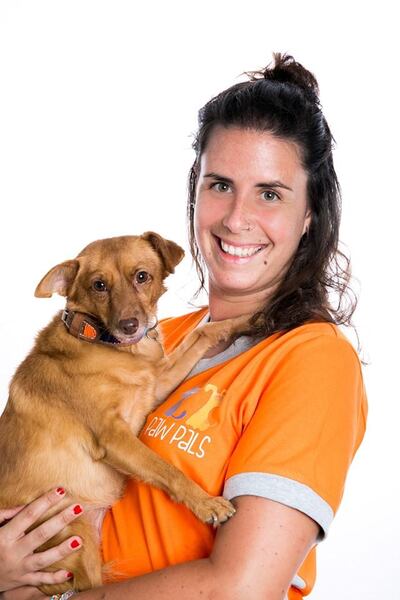Over the past few months, many people have found themselves working from home amid the coronavirus pandemic.
While in self-isolation, some have taken to fostering or adopting a pet with many sharing stories of how much joy the whole experience has brought them.
However, as cities begin to reopen and people slowly start heading back into the office, some pet owners may worry about leaving their animals home alone once again.
Cats are slightly easier, as they are known to enjoy independence, but dogs are undeniably more attached to their owners. However, there are ways to ease them back into a more independent life, so they are not left feeling stressed or depressed.
"Dogs shouldn't be left alone for extended periods of the day anyway, even under normal circumstances. They're pack animals, they're sociable animals, they need to be part of what's going on," says Dr Martin Wyness, of British Veterinary Centre in Abu Dhabi.
"So they can be left for a certain amount of time – different animals will have a different tolerance to this – but typically, a couple of hours is fine or maybe a morning or an afternoon, but you shouldn't be going a whole day with your animal just being alone in an apartment, that's too much time."
For those wondering how they can help their canines adjust, here are some tips from the experts:
Start preparing now
Those who know they will have to return to the office should prepare their dogs for that sooner rather than later.
"Leave the house for small periods of time and promote alone time for your dog, even if you are inside the house," advises Mena Lopes, a dog trainer at Dubai's Paw Pals. "You can also help them by creating a positive experience with being alone."
As dogs tend to be receptive towards being rewarded with treats, she suggests giving them something to lick.
"You can freeze kefir milk or plain yoghurt in silicone molds and give to your dog while you are away. You can also reuse yoghurt cups. You can put some peanut butter on the walls for them to lick or just hide treats in a box around the house or use a treat dispenser toy," she says.
Offer them a safe space
Another recommendation is to leave your canine in a safe area that they are familiar with. For some it might be in a crate while for others, it may be a room.
"A crate or any space that's considered theirs should always be part of the environment. It's just not as a discipline, it's used as somewhere to go when they need security," says Wyness.
Whatever the choice, Lopes suggests readying the space by making sure there is something to distract them while they are alone, such as something to chew, lick or sniff.
"Leave your dog alone in a safe room or area in the house until you are sure he is OK with being alone. They might whine and even get a bit destructive, so always keep your animal in a safe area where whatever is at their reach, they can have," she says.
Find new ways to keep them entertained
Obviously, leaving a pet at home without any sort of entertainment is not ideal. Wyness suggests finding toys that can help dogs get in some mental stimulation during the day, as well as hiding treats around the house for them to find.
"If they've got toys of their own, they can amuse themselves with that. There are some quite innovative toys now. The ones that are challenging and get them to use their minds are good," she says.
However, for some, the thought of leaving their canine alone all day is simply too much. Other solutions to consider include doggie daycare and using a dog-walker. But it should be noted that not all dogs enjoy being in daycare, so it shouldn't be something forced upon them.
"You can also consider a walker to check on your dog during the day if you are going back to the office full time," Lopes says. "Teaching the dog to be alone at home is important, but daycare could be a good option if the dogs enjoys it."
When does being separated become more serious?
Sometimes there can be problems that run deeper, especially in relation to separation anxiety, which Lopes deems a "serious issue that should be addressed properly."
"It depends a lot from dog to dog. If yours barks or whines all the time when you are away, pees and poops inside the house (and he is potty trained), or gets destructive, those are some signs that your dog is not coping with being alone," she says. "If the dogs keep showing signs of anxiety, I would recommend getting in touch with a dog trainer."
It's a process
Pet owners should ensure that their canines have a successful transition by involving them in a routine to keep them feeling happy and secure and to take notice if there are any behavioural changes.
"It's a process," Lopes says. "They are used to having their owners around all day, so slowly, they need to get into the new routine."
Global state-owned investor ranking by size
|
1.
|
United States
|
|
2.
|
China
|
|
3.
|
UAE
|
|
4.
|
Japan
|
|
5
|
Norway
|
|
6.
|
Canada
|
|
7.
|
Singapore
|
|
8.
|
Australia
|
|
9.
|
Saudi Arabia
|
|
10.
|
South Korea
|
The%20specs
%3Cp%3E%3Cstrong%3EEngine%3A%3C%2Fstrong%3E%20Dual%20synchronous%20electric%20motors%0D%3Cbr%3E%3Cstrong%3EPower%3A%20%3C%2Fstrong%3E660hp%0D%3Cbr%3E%3Cstrong%3ETorque%3A%20%3C%2Fstrong%3E1%2C100Nm%0D%3Cbr%3E%3Cstrong%3ETransmission%3A%20%3C%2Fstrong%3ESingle-speed%20automatic%0D%3Cbr%3E%3Cstrong%3ETouring%20range%3A%20%3C%2Fstrong%3E488km-560km%0D%3Cbr%3E%3Cstrong%3EPrice%3A%20%3C%2Fstrong%3EFrom%20Dh850%2C000%20(estimate)%0D%3Cbr%3E%3Cstrong%3EOn%20sale%3A%20%3C%2Fstrong%3EOctober%3C%2Fp%3E%0A
Mercer, the investment consulting arm of US services company Marsh & McLennan, expects its wealth division to at least double its assets under management (AUM) in the Middle East as wealth in the region continues to grow despite economic headwinds, a company official said.
Mercer Wealth, which globally has $160 billion in AUM, plans to boost its AUM in the region to $2-$3bn in the next 2-3 years from the present $1bn, said Yasir AbuShaban, a Dubai-based principal with Mercer Wealth.
“Within the next two to three years, we are looking at reaching $2 to $3 billion as a conservative estimate and we do see an opportunity to do so,” said Mr AbuShaban.
Mercer does not directly make investments, but allocates clients’ money they have discretion to, to professional asset managers. They also provide advice to clients.
“We have buying power. We can negotiate on their (client’s) behalf with asset managers to provide them lower fees than they otherwise would have to get on their own,” he added.
Mercer Wealth’s clients include sovereign wealth funds, family offices, and insurance companies among others.
From its office in Dubai, Mercer also looks after Africa, India and Turkey, where they also see opportunity for growth.
Wealth creation in Middle East and Africa (MEA) grew 8.5 per cent to $8.1 trillion last year from $7.5tn in 2015, higher than last year’s global average of 6 per cent and the second-highest growth in a region after Asia-Pacific which grew 9.9 per cent, according to consultancy Boston Consulting Group (BCG). In the region, where wealth grew just 1.9 per cent in 2015 compared with 2014, a pickup in oil prices has helped in wealth generation.
BCG is forecasting MEA wealth will rise to $12tn by 2021, growing at an annual average of 8 per cent.
Drivers of wealth generation in the region will be split evenly between new wealth creation and growth of performance of existing assets, according to BCG.
Another general trend in the region is clients’ looking for a comprehensive approach to investing, according to Mr AbuShaban.
“Institutional investors or some of the families are seeing a slowdown in the available capital they have to invest and in that sense they are looking at optimizing the way they manage their portfolios and making sure they are not investing haphazardly and different parts of their investment are working together,” said Mr AbuShaban.
Some clients also have a higher appetite for risk, given the low interest-rate environment that does not provide enough yield for some institutional investors. These clients are keen to invest in illiquid assets, such as private equity and infrastructure.
“What we have seen is a desire for higher returns in what has been a low-return environment specifically in various fixed income or bonds,” he said.
“In this environment, we have seen a de facto increase in the risk that clients are taking in things like illiquid investments, private equity investments, infrastructure and private debt, those kind of investments were higher illiquidity results in incrementally higher returns.”
The Abu Dhabi Investment Authority, one of the largest sovereign wealth funds, said in its 2016 report that has gradually increased its exposure in direct private equity and private credit transactions, mainly in Asian markets and especially in China and India. The authority’s private equity department focused on structured equities owing to “their defensive characteristics.”
The specs
Engine: 4.0-litre V8 twin-turbocharged and three electric motors
Power: Combined output 920hp
Torque: 730Nm at 4,000-7,000rpm
Transmission: 8-speed dual-clutch automatic
Fuel consumption: 11.2L/100km
On sale: Now, deliveries expected later in 2025
Price: expected to start at Dh1,432,000
How Beautiful this world is!
Company%20profile
%3Cp%3E%3Cstrong%3ECompany%20name%3A%20%3C%2Fstrong%3EXare%C2%A0%3C%2Fp%3E%0A%3Cp%3E%3Cstrong%3EStarted%3A%20%3C%2Fstrong%3EJanuary%2018%2C%202021%C2%A0%3C%2Fp%3E%0A%3Cp%3E%3Cstrong%3EFounders%3A%20%3C%2Fstrong%3EPadmini%20Gupta%2C%20Milind%20Singh%2C%20Mandeep%20Singh%C2%A0%3C%2Fp%3E%0A%3Cp%3E%3Cstrong%3EBased%3A%20%3C%2Fstrong%3EDubai%C2%A0%3C%2Fp%3E%0A%3Cp%3E%3Cstrong%3ESector%3A%20%3C%2Fstrong%3EFinTech%C2%A0%3C%2Fp%3E%0A%3Cp%3E%3Cstrong%3EFunds%20Raised%3A%20%3C%2Fstrong%3E%2410%20million%C2%A0%3C%2Fp%3E%0A%3Cp%3E%3Cstrong%3ECurrent%20number%20of%20staff%3A%20%3C%2Fstrong%3E28%C2%A0%3C%2Fp%3E%0A%3Cp%3E%3Cstrong%3EInvestment%20stage%3A%20%3C%2Fstrong%3Eundisclosed%3C%2Fp%3E%0A%3Cp%3E%3Cstrong%3EInvestors%3A%20%3C%2Fstrong%3EMS%26amp%3BAD%20Ventures%2C%20Middle%20East%20Venture%20Partners%2C%20Astra%20Amco%2C%20the%20Dubai%20International%20Financial%20Centre%2C%20Fintech%20Fund%2C%20500%20Startups%2C%20Khwarizmi%20Ventures%2C%20and%20Phoenician%20Funds%3C%2Fp%3E%0A
French business
France has organised a delegation of leading businesses to travel to Syria. The group was led by French shipping giant CMA CGM, which struck a 30-year contract in May with the Syrian government to develop and run Latakia port. Also present were water and waste management company Suez, defence multinational Thales, and Ellipse Group, which is currently looking into rehabilitating Syrian hospitals.





